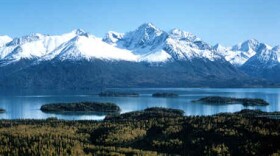If you ask the chief advocate for Alaska’s hospitals and nursing homes, Jared Kosin, there are plenty of ways to improve health care in the state. He said reducing the number of people with health insurance isn’t one of them.
"This is terrible health care policy,” said Kosin, who heads the Alaska Hospital and Healthcare Association. “The predominant issue with it is it's premised on achieving a savings target, that's what they’re after, to fund these tax cuts.”
The Republican megabill making its way through Congress would make significant changes to benefits programs like Medicaid and SNAP, which would affect Alaskans across the state. The so-called “big, beautiful bill” with tax and spending cuts is changing fast, and it’ll likely keep changing right up until the bill passes.
The Congressional Budget Office, Congress’s official scorekeeper, estimates that the version of the bill that passed the House would push 16 million Americans off of government-funded or -subsidized health insurance. Divide that by Alaska’s population, and you get somewhere in the neighborhood of 30 to 40 thousand Alaskans at risk of losing insurance, either from Medicaid, which the state calls DenaliCare, or the federal health insurance marketplace.
That doesn’t mean those Alaskans won’t need health care.
But Kosin said they won’t get it until it becomes urgent. Hospital emergency rooms have to see everyone, even those who can’t pay. That would push up the cost of healthcare for everybody else, he said.
“What you can expect from that is there'd probably be a pretty significant cost shift over to private insurance, and so you'd see an increase in premiums for everyone else to offset these massive losses,” Kosin said.
Kosin said the drop in the number of insured people, especially in low-income rural areas with many Medicaid patients, would force hospitals to cut back on services or even close their doors.
The bill House Republicans passed includes new work requirements for Medicaid. That means that every six months, you have to prove to the state, which administers the program, that you have a job and that you’re working at least 80 hours a month. Or that you’re exempt.
Right now, though, the state is already struggling to keep up with the paperwork it’s tasked with and has a well-documented backlog.
Billy Stapleton Jr. is a state benefits processor and union representative who went to Washington to push back on the bill, and said new paperwork requirements would make things worse.
“That would cripple us because Medicaid is renewed once a year,” he said. “Now we have to focus on one case and put eyes and hands on it twice a year.”
The Alaska Division of Public Assistance is already way behind. He said he’s currently, in June, processing applications for the Supplemental Nutrition Assistance Program, or SNAP, that have been pending since November.
The House version of the bill has provisions that would require Alaska to pay tens of millions of dollars for the SNAP program. And whether the state could afford to pick up the tab is unclear, said state House Finance Committee co-chair Andy Josephson, an Anchorage Democrat.
“Will the Legislature, writ large, and the governor support back filling those items? I don't know. That's an open question,” he said.
Another open question is whether the SNAP provisions make it into the final bill at all. And that’s a lot of what Alaska’s Senate delegation is saying right now: The bill is in flux.
A spokesperson for Republican Sen. Dan Sullivan said he’s working hard to ensure the final bill doesn’t reduce Alaskans’ access to Medicaid or SNAP benefits.
She said Sullivan generally supports work requirements for Medicaid and doesn’t see them as a cut. But, she said Sullivan has pushed for a variety of “exemptions and carve-outs to protect vulnerable Alaskans.”
“He will continue to work during implementation to ensure that paperwork and administrative burdens do not prevent people from accessing the critical safety net programs they rely on,” Sullivan’s communications director, Amanda Coyne, said by email.
The bill exempts most Alaska Native people, people in high-unemployment areas, parents, veterans, pregnant women and people with mental health conditions, including substance abuse issues.
At the same time, opponents say that just applying the exemptions would be challenging for the state and the applicants.
But another thing to note: the Senate’s working copy of the bill allows the federal government to exempt states like Alaska from implementing the work requirement through 2028, as long as the state makes a good faith effort to upgrade its systems to handle the new paperwork requirements. But there are no guarantees the state would get that exemption.
A spokesperson for Republican Sen. Lisa Murkowski said she continues to have concerns about the bill and its impact on Alaskans who depend on Medicaid and SNAP.
“The landscape is rapidly evolving and discussions are ongoing,” spokesperson Joe Plesha said in a statement.
It’s unclear when the Senate will take up amendments and start voting on the bill. But President Donald Trump is pushing for the final bill to be passed by the Fourth of July.







